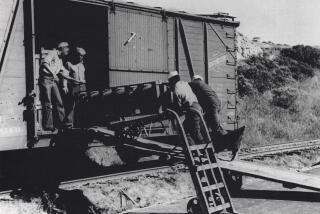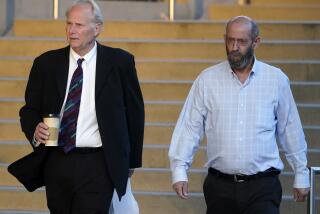Court-Martial Acquits Skipper of the Kinkaid
- Share via
SAN DIEGO — Cmdr. John Cochrane, commanding officer of the destroyer Kinkaid, which crashed into a merchant ship by the Strait of Malacca, was found not guilty of criminal negligence Wednesday in a court-martial decision.
Cochrane was acquitted because the Navy prosecutor failed to prove “beyond a reasonable doubt” that the San Diego officer was criminally liable for what occurred aboard his ship early one morning last November, said Capt. Richard Reed, a South West Judicial Circuit military judge.
Cochrane was the first Navy skipper to face a court-martial for a collision in more than a decade. He was charged with dereliction of duty and negligently endangering his vessel.
“Obviously, I feel a great deal of relief,” said Cochrane, 44, a Navy veteran of nearly 21 years. “I was exonerated, which shows military justice works as it is supposed to.”
The Kinkaid, on the wrong side of one of the world’s busiest shipping straits, crashed into a Panamanian vessel--killing the Navy navigator, Lt. Sean McPhee, 24, and injuring 17 sailors. “We never held the captain responsible for the accident,” the navigator’s mother, Anne McPhee, said in a telephone interview from Santa Rosa. “Sean always liked the captain. This was an accident. Sean could have been killed on the Los Angeles freeway. Things happen.”
Reed, before announcing his verdict, pointed out a distinction between criminal liability and accountability.
“Since criminal liability, if any, is based on negligence, I have focused my attention during this trial on whether or not the conduct of this commanding officer, Cmdr. Cochrane, was reasonable in light of his rank, experience and customs of the service, safety, and protection of” vessels and crew at sea, Reed said.
A key issue, Reed said, was what Cochrane knew and what he should have known about the location and running of his vessel. And Reed concluded that Cochrane’s actions were “reasonable.”
After the verdict was announced, a somber yet happy Cochrane turned and embraced his wife Suzanne, who sat through each day of the court-martial.
“I did feel bitter for a time,” said Suzanne, teary-eyed. “But with two words--not guilty--all that disappeared. And now I am overjoyed.”
Cochrane said he is uncertain about his future. Repeating that he harbors no ill feeling toward the Navy for instigating court-martial proceedings against him, Cochrane said: “I am not bitter. I love the U.S. Navy.”
Lt. Tom Courtney, one of Cochrane’s attorneys, said the Navy had assigned accountability to Cochrane for the accident by stripping him of his command last fall. Had he been found guilty, Cochrane would have faced a maximum penalty of two years in the brig, dismissal from the Navy, and forfeiture of all future pay--including his pension.
In closing arguments Wednesday, the Navy prosecutor and defense attorneys debated who was ultimately responsible for the crash of the Kinkaid.
Lt. Cmdr. Leroy Dickens, the prosecutor, touted the long-held Navy doctrine that a captain is accountable for his ship and crew, and said Cochrane’s poor leadership and inadequate training of his crew led to the crash.
During the eight-day proceeding, Dickens called more than 20 witnesses who testified that the ship’s crew members had little idea where they were before the vessel crashed; some men on watch were ill-qualified; only three of the ship’s 13 binoculars were fully functioning, and the combat information center had six instead of 12 sailors manning it.
But defense attorneys maintained that a captain must rely on his crew in running his ship. And, should his men ignore crucial orders, such as informing the skipper of close-passing ships, then the captain cannot be held criminally negligent.
Saying that Cochrane did not shirk his responsibility for the Kinkaid, Smith said the skipper could not be criminally liable for events occurring that he knew nothing about.
“He trusted his officers to do their duty and to obey his orders,” Smith said.
The crash occurred because the duty officer failed to obey orders to contact the sleeping Cochrane when he sighted lights, became confused about his location or spotted close-passing ships, Smith said.
The duty officer’s failure, however, was compounded by the error of the navigator, who miscalculated the Kinkaid’s position and time that it would enter the Strait of Malacca, said Smith. The failures of the navigator, whom Cochrane considered one of his best officers, and the duty officer were “monumental, unpredictable, and inexplicable,” Smith said.
“A commanding officer cannot do everything. He trains. He monitors. He leads,” Smith said. “Ultimately, he must rely on officers and men to do their jobs.”
After more than a week of testimony, much of which painted the Kinkaid and its crew as a Navy version of Keystone Cops, the decision to acquit Cochrane seemed to surprise few military experts but shocked many local officers.
“The decision doesn’t change the standards of accountability one whit,” said Cmdr. Danny Barrett, a senior prosecutor who observed the proceedings. “In this case, the facts did not justify criminal liability.”
Cochrane testified Tuesday that he suffered a memory loss after the collision and provided an erroneous account of the accident to an investigating admiral. Cochrane testified he had forgotten that the ship’s navigator had told him they would reach the strait at 10 a.m.--not 5 a.m., as he had told investigators.
As a result of this conversation with the navigator, Cochrane said, he had not ordered the appropriate procedures for entering the straits.
A neuropsychologist--Lt. Cmdr. David Spaulding--testified that Cochrane’s memory lapse could be attributed to the post-traumatic stress he had suffered in the month after the collision.
“I sure as heck wouldn’t want to work for him in a pressure or battle situation,” said one senior enlisted man, who asked that his name not be used. “Post-traumatic stress syndrome? Give me a break. The only thing Cochrane didn’t claim was that he did this to impress Jodi Foster.”
Still others, however, said the decision reflected careful, deliberate military justice.
“It all boils down to whether you believe Cochrane--and I do,” said retired Adm. Lee Baggett, a former commander-in-chief of the Atlantic Forces and supreme allied commander of the Atlantic Fleet. Baggett once worked with Cochrane and testified on his behalf, saying that his actions aboard the Kinkaid were “reasonable.”
“The point here,” Baggett said, “is that command responsibility does not necessarily extend to criminal responsibility.”
More to Read
Sign up for Essential California
The most important California stories and recommendations in your inbox every morning.
You may occasionally receive promotional content from the Los Angeles Times.









